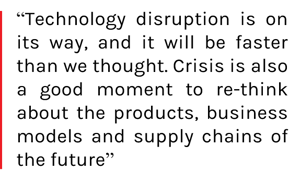Time to innovate and collaborate — funding opportunities for health and sustainability initiatives
Despite the global crisis or perhaps because of it, this is a perfect time to innovate, renew and collaborate. Why is that? We talked to our experts Laura Koponen and Patrick Halford to get an overview of how these times of uncertainty could actually benefit companies developing solutions in health, well-being and sustainability.
Our managing director Laura Koponen told us what is in store for companies that have solutions and innovations to help the world in these challenging times in the areas of co-innovation, health and well-being and sustainability.
According to Laura, our world will look different in the post-COVID-19 era. For example, there will be more remote working and new digital tools to enable it. Gradually the companies, their products and services will change accordingly. Social distancing is not something that will completely disappear so new tools to make things work, such as drones and other robots, will be developed to make us feel more secure.

Patrick Halford, our Vice President for Key Digital Technologies, adds: “Nascent technologies that were once the province of specialist activities are being rapidly deployed across industries. Case in point; robots which can be quickly re-tasked to provide autonomous hygiene solutions in hospitals, schools, offices and transportation systems. At the same time, drones are being unleashed to solve urgent logistical needs, perform cleansing functions indoors and outdoors, inspection, safety and many other operations.”
At the moment, innovation is risky and expensive but there is also more public funding available than ever for those companies who have what it takes to innovate. “Across the organisational spectrum, teams are harnessing previously held-back capabilities to solve urgent problems. In the process they are discovering new value chains that can re-wire revenue streams. Technology disruption is on its way, and it will be faster than we thought. Crisis is also a good moment to re-think about the products, business models and supply chains of the future. The most innovative companies are the ones to survive and grow after the pandemic,” Patrick continues.
Laura concludes: “Should you have even an inkling on how to renew your company or ideas on how to disrupt, we are happy to help you and tell more about the available funding for your business.” Below is a summary of some of the current funding options worth looking into.
|
Co-innovation funding from Business Finland Since January 2020, the renewed Business Finland Co-Innovation funding for Finnish companies and research organisations continues to increase collaboration of researchers with both companies and international partners. Now, to be eligible, the joined research projects must have international collaboration. The reform increased the level of Business Finland funding to 70% of the total eligible research project costs. The project sizes typically range between 500k–3M€. |
|
122 M€ additional funding from EU to consortiums to respond to the COVID-19 pandemic The European Commission has launched an additional 122 M€ to fund co-innovation in ecosystems and consortiums to rapidly counter the effects of the COVID-19. This second COVID-19 call is for innovative and rapid health-related approaches to respond to the pandemic and to deliver quick results for our society. The call is intended for consortiums with several partners, and has focus areas for example in
Due to its urgency, the call opened on the 19th of May and closes on the 11th June 2020. |
|
European Green Deal Horizon 2020 call for sustainable businesses The Green Deal Horizon 2020 call is a European Commission call releasing 600 M€ for innovative solutions and demonstrations in their respective areas. Out of the total of 11 areas, the main eight focus areas entail the following topics in practice:
This call is expected to open in the summer or early autumn of 2020 and estimated to close in January 2021. For more details on this call, register to the Business Finland webinar held on Wed, 27th May, 2020. |
|
EU Innovation Fund for innovations to reduce emissions The EU Commission has announced an investment programme worth 10-20 Bn€ as a successor of the ended NER300 programme. The Innovation Fund will focus on highly innovative technologies and big flagship projects with European value added that can bring on significant emission reductions established for the period 2021 to 2030.
The EU Innovation Fund will provide grants up to 60% of the additional capital and operational costs linked to innovation. The first call in 2020 will be officially opened in June or July and it is targeted at large projects with capital expense of over 7.5 M€. |
Does your company have what it takes to apply for the funding introduced above? Contact us for finding out more about your company’s eligibility and possible partners today.
